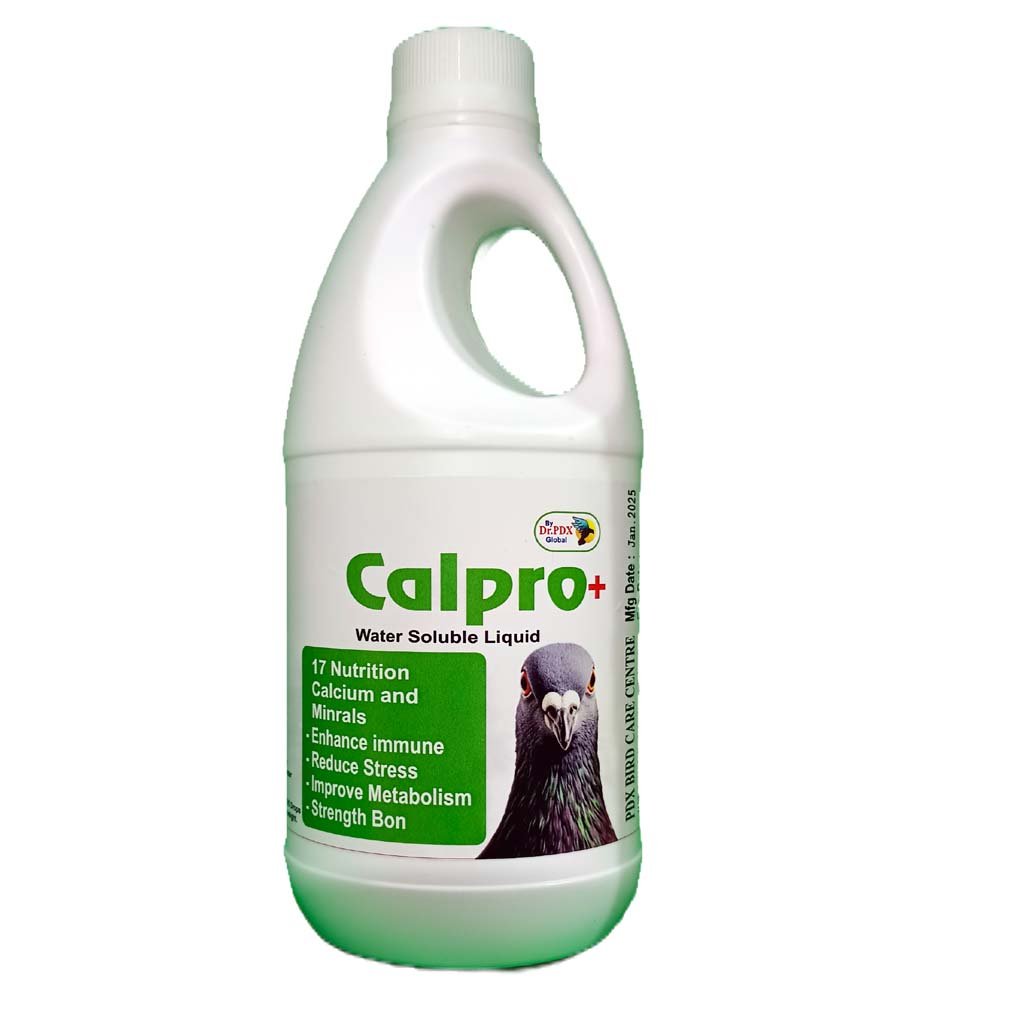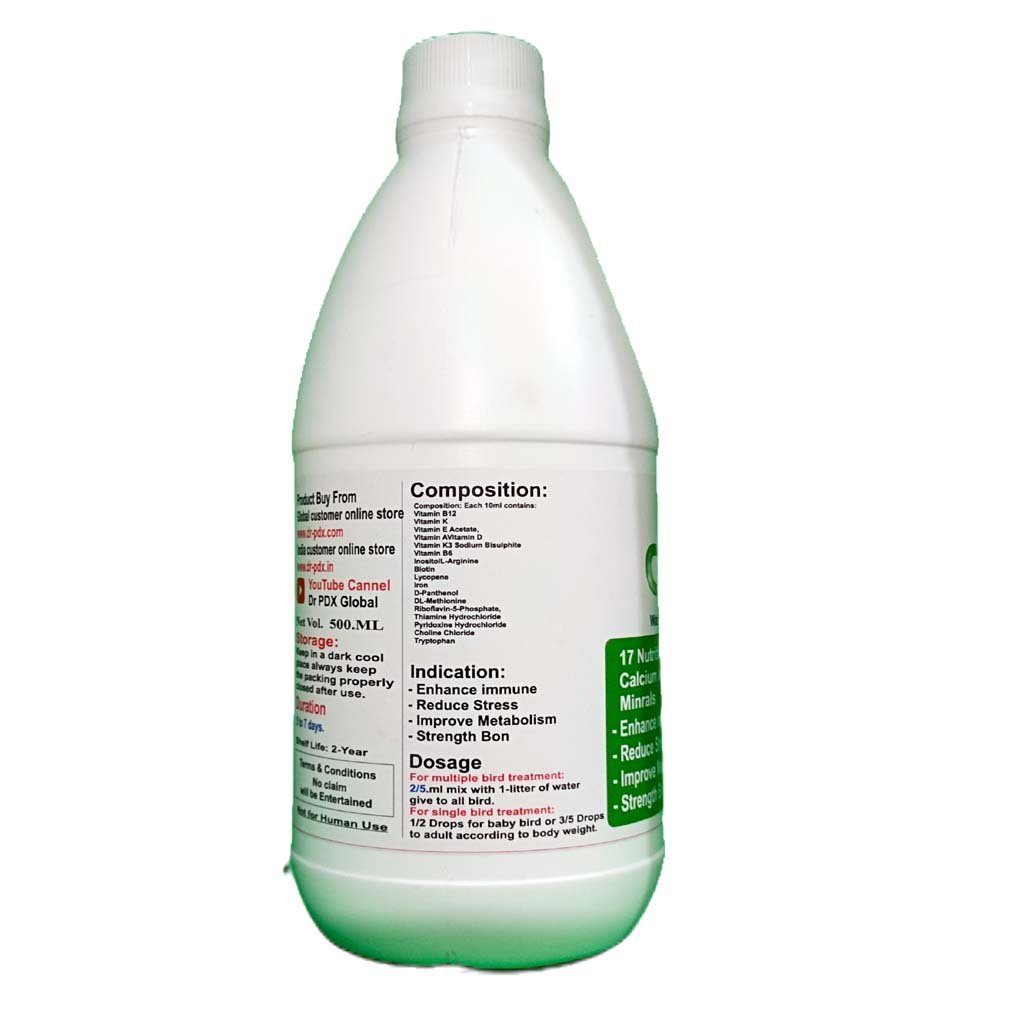Calcium is vital for pigeons, playing a key role in skeletal and muscular health, eggshell formation, and proper nerve function. It’s especially important during breeding and growth periods for building strong bones and producing healthy eggs. Calcium deficiency can lead to various health issues, including weak bones, soft-shelled eggs, and even paralysis.
Vitamin B12 is crucial for pigeon health, particularly during racing and breeding seasons. It supports red blood cell formation, nervous system function, and energy metabolism, contributing to improved performance, increased stamina, and overall well-being.
Vitamin K is crucial for pigeons as it’s essential for blood clotting and wound healing. It plays a key role in the synthesis of prothrombin, a protein involved in the clotting process. A deficiency can lead to excessive bleeding and delayed healing, especially after injuries sustained during flights or fights.
Vitamin E Acetate benefits pigeons by acting as an antioxidant, supporting muscle function, and boosting fertility. It protects cell membranes, aids in muscle recovery after races, and increases fertility in breeding pigeons. Additionally, it helps prevent muscle atrophy and stiffness.
Vitamin A is crucial for pigeons, supporting various bodily functions like healthy skin, mucus membranes, vision, feather development, and immune system strength. A deficiency can lead to respiratory issues, poor feather quality, and a weakened immune system.
Vitamin D is crucial for pigeons as it facilitates the absorption of calcium and phosphorus, which are vital for strong bones, healthy feather development, and overall health. It also plays a role in maintaining a healthy nervous system and supports proper eggshell quality in breeding pigeons. Deficiencies can lead to weakened bones, poor feather growth, and even behavioral changes
- Vitamin K3 Sodium Bisulfite
Vitamin K3 (Menadione Sodium Bisulfite) is a synthetic form of Vitamin K, primarily used as a feed additive in poultry and livestock to promote blood clotting and bone metabolism. For pigeons, it can be beneficial in preventing and treating hemorrhagic conditions caused by Vitamin K deficiency, supporting overall health and potentially aiding in recovery from coccidiosis.
Vitamin B6 plays a crucial role in various metabolic processes, while electrolytes help maintain a proper moisture balance and prevent dehydration in your birds. Simply mix 15g with 500g of feed upon your birds’ return from a race and during breeding.Vitamin B6 plays a crucial role in various metabolic processes, while electrolytes help maintain a proper moisture balance and prevent dehydration in your birds. Simply mix 15g with 500g of feed upon your birds’ return from a race and during breeding.
Inositol-arginine specifically in the form of inositol-stabilized arginine silicate (ASI), offers several potential benefits for pigeons, primarily related to improved blood flow, bone health, and overall performance. This combination enhances the bioavailability of arginine, leading to increased nitric oxide (NO) production, which is crucial for vasodilation and improved circulation.
Biotin and lycopene, along with other vitamins and minerals, can benefit pigeons in various ways. Biotin, a B vitamin, supports healthy skin, feathers, and overall metabolism. Lycopene, an antioxidant, helps protect cells from damage caused by free radicals and can improve antioxidant status. Together, these nutrients can contribute to better feather quality, increased energy, and overall health for pigeons.
Iron is a crucial mineral for pigeons, primarily aiding in oxygen transport throughout the body. It is a key component of hemoglobin, the protein in red blood cells responsible for carrying oxygen. Iron supplementation can be particularly beneficial during high-stress periods like breeding, racing, and moulting, when the demand for oxygen increases. Iron is a crucial mineral for pigeons, primarily aiding in oxygen transport throughout the body. It is a key component of hemoglobin, the protein in red blood cells responsible for carrying oxygen. Iron supplementation can be particularly beneficial during high-stress periods like breeding, racing, and moulting, when the demand for oxygen increases.
D-Panthenol, also known as provitamin B5, is a beneficial ingredient for pigeons, primarily due to its moisturizing, healing, and anti-inflammatory properties. It helps maintain skin and feather health, aids in wound recovery, and can reduce irritation.
DL-Methionine, an essential amino acid, is beneficial for pigeons as it supports various bodily functions, including growth, feather development, and overall health. It is crucial for protein synthesis, muscle development, and enhances the immune response in pigeons. Supplementation can also improve feed conversion rates and help in detoxification processes.
Riboflavin-5-Phosphate, also known as Vitamin B2, is crucial for pigeons, playing a key role in energy production, cellular function, and overall health. It is a component of the coenzymes FMN and FAD, which are essential for metabolizing fats, proteins, and carbohydrates for energy. Deficiencies in riboflavin can lead to various health issues, including impaired growth, poor feather quality, and neurological problems.
Thiamine hydrochloride, also known as Vitamin B1, is crucial for pigeons, playing a key role in energy metabolism and nerve function. It helps pigeons convert food into usable energy and supports a healthy nervous system, aiding in recovery from stress and fatigue. Deficiency can lead to serious issues like opisthotonus (head retraction), leg weakness, and even cardiac failure.
Thiamine hydrochloride, also known as Vitamin B1, is crucial for pigeons, playing a key role in energy metabolism and nerve function. It helps pigeons convert food into usable energy and supports a healthy nervous system, aiding in recovery from stress and fatigue. Deficiency can lead to serious issues like opisthotonus (head retraction), leg weakness, and even cardiac failure.
Choline chloride is an essential nutrient that offers several benefits for pigeons, primarily related to liver health, fat metabolism, and overall well-being. It helps prevent fatty liver syndrome by facilitating fat transport from the liver and promoting healthy liver function. Choline also plays a crucial role in maintaining cell structure, nervous system function, and reproductive health in pigeons.
Tryptophan, an essential amino acid, offers various benefits for pigeons. It aids in protein synthesis, enhances growth, improves feed efficiency, and can reduce stress and aggression, potentially improving overall welfare. It also plays a role in immune function and may have anti-inflammatory effects.










